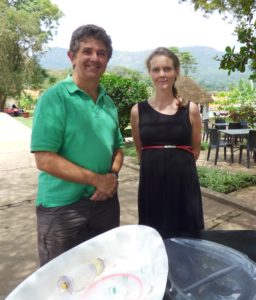Invention could save hundreds of thousands of babies’ lives
Hundreds of thousands of babies’ lives could be saved in developing countries each year thanks to a game-changing invention by a UK doctor in partnership with Ugandan colleagues.
The BabySaver, developed by Professor Andrew Weeks, a consultant obstetrician from Liverpool, is a simple plastic unit where babies can be resuscitated without having to separate them from their mothers.
It costs under £40 ($50) a fraction of the price of traditional resuscitation units which cost between £8,000 – £15,000 ($10,000 – $20,0000). The aim is that they will be rolled out to every hospital in Uganda before being used more widely.
The unit, which contains equipment like a suction device and stethoscope, can be placed between a mother’s legs enabling the umbilical cord to remain intact whilst doctors treat her baby – this has important health benefits for the woman and her newborn child.
Costly, more complex devices require electricity – something that is often unavailable for the thousands of babies that are born at home in rural areas in Uganda and elsewhere across the world.
The University of Liverpool’s Professor Weeks said: “Each year approximately six million babies across the world require basic neonatal resuscitation and around 900,000 of these will die. The vast majority of deaths occur in low-income settings where there are few facilities for newborn resuscitation at birth.
“Where resuscitation does occur, it often happens away from the mother – or even in another room, which can be very distressing for the mother and baby.
“The BabySaver enables resuscitation to take place at the bedside, with the umbilical cord still attached. Allowing the cord to stay intact has huge health benefits for new-born babies but it also allows the midwife to stay with the mother at a high-risk time for her.”
“We truly believe it will be a game-changer for families across Uganda, and hopefully even further afield.”
The product has been developed in conjunction with Peter Watt, a design engineer at the Royal Liverpool and Broadgreen University Hospitals Trust, after trials with staff and patients at the Mbale Regional Referral Hospital (MRRH) in Uganda.
The prototypes have been manufactured by a team at the Bryn Y Neuadd Hospital in Gwynedd.
Dr Kathy Burgoine, Head of the Neonatal Unit at MRRH said: “We are delighted to be supporting Prof Weeks and his team with this project. The unit is literally a life-saver and will transform the way newborn resuscitation is carried out in our hospitals and the wider community.”
The project has been funded by Grand Challenges Canada, which funds innovative projects in low-income countries across the world, and the Sir Halley Stewart Trust, a grant-giving charity that supports innovative and pioneering social, medical and religious projects.
